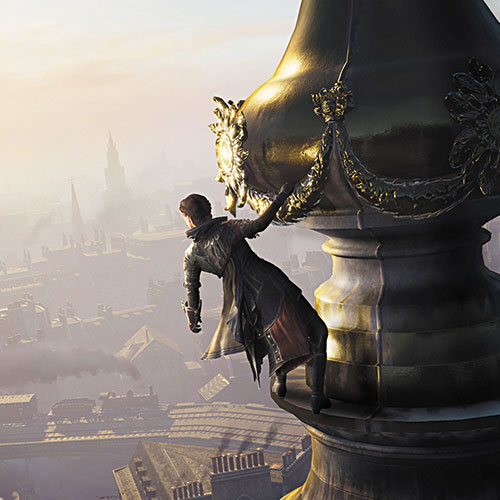‘Assassin’s Creed’ gets back to basics

By Joe Juba | Game Informer Magazine
Assassin’s Creed Syndicate
Format: PlayStation 4, Xbox One, PC
Style: 1-Player Action
Publisher: Ubisoft
Developer: Ubisoft Quebec
Rating: M, for Mature
The “Assassin’s Creed” series has been running for eight years, and that kind of longevity doesn’t happen without taking a few risks. To combat fatigue, each entry attempts to punctuate the familiar with new elements. Not all of these experiments pay off, but successful ideas might get folded into the core formula. “Assassin’s Creed Syndicate” is the result of this process at its best; it removes outdated mechanics, refines the best concepts from other installments, and still makes its own contributions to the series’ evolution. It can’t be everything to every fan, but “Syndicate” is the most fun I’ve had with an “Assassin’s Creed” title since “Brotherhood.”
For the first time since Ezio, I’d like to see the story of these heroes continue in future installments. Evie and Jacob Frye star as twin Assassins who attempt to retake London from the Templars in 1868. Using two protagonists works surprisingly well, since anything useful you gain as one sibling can be accessed by the other. Evie is the more likable of the pair; her measured demeanor and preference for stealth lines up better with my perception of an assassin, especially compared to Jacob’s more violent and impulse-driven philosophy. Despite their defined narrative roles, Jacob can still sneak and Evie can still fight, though their aptitudes are based on how you develop them.
Progression has improved significantly since “Unity,” borrowing from traditional RPGs in the ways you gain levels, craft gear and spend skill points. Whether you’re doing missions for the ridiculous parade of historical figures or conquering London (my pursuit of choice), your activities result in a steady flow of money, materials, and experience, which you funnel back into your characters and gang. This satisfying gameplay loop surrounding your gradual ascent conveys a sense of growing power and influence, and ensures that no time you spend playing “Syndicate” is wasted.
My favorite missions are the main assassinations, which combine freeform infiltration with some guided set-piece moments to set up unique and gruesome kills. Of course, you can also blow it and complete the mission by starting a bloody brawl. Though your success in a fight is still dependent on your ability to counter incoming attacks and break guards, “Syndicate” lets you go on the offensive. The fast and responsive combat often has you taking down groups of three or more assailants and setting up multi-kill maneuvers, making the Fryes feel like the elite warriors they are (though the enemies’ “one-at-a-time” approach to attacking doesn’t help). Just be sure you don’t wander into a high-level zone, since even a small disparity can spell big trouble for you.
Getting drawn into “Syndicate’s” well-crafted version of London is easy, and you have a few new ways to get around. Horse-drawn carriages make the city feel like a Victorian “Grand Theft Auto” with clunky and uncooperative cars. The underwhelming carriages would be a bigger problem if not for another new form of transportation: the zipline. Like Batman’s grapnel gun, this fantastic tool lets you climb buildings and cross gaps with ease, removing the need to shimmy around looking for windowsills and ledges. It keeps traversal fun but makes it less fussy and tedious. After using the zipline to ascend Big Ben in seconds, I can’t imagine going back.
Despite “Syndicate’s” solid additions, franchise fans should notice plenty of other returning ideas in improved forms. Retaking the city piece-by-piece recalls the thrill of reclaiming Rome in “Brotherhood.” Crafting new equipment and upgrades borrows from Black Flag’s system. Even Unity’s Helix Rifts, which open playable sequences in different eras, have been adapted for one surprising section.
After “Unity’s” troubled launch, you may be wary of “Syndicate.” I was too, but the major gameplay problems from “Unity” are gone. “Syndicate” isn’t glitch-free, but its technical anomalies (A.I. issues, stalled objectives, wonky collision) are in the same tier that fans have seen since the series’ inception. That doesn’t make them less annoying, but outside of an occasional cutscene or checkpoint, they don’t mar the experience significantly.
For all of the familiar parts of “Syndicate,” it still feels inventive. It may draw inspiration from previous installments, but features like the zipline and revamped progression system demonstrate a willingness to cut stagnant elements loose. With a cool setting, memorable characters, and a wealth of content, “Syndicate” has all of the hallmarks of a great “Assassin’s Creed” entry — but it also surprised me by challenging what I previously thought a great entry should be.











